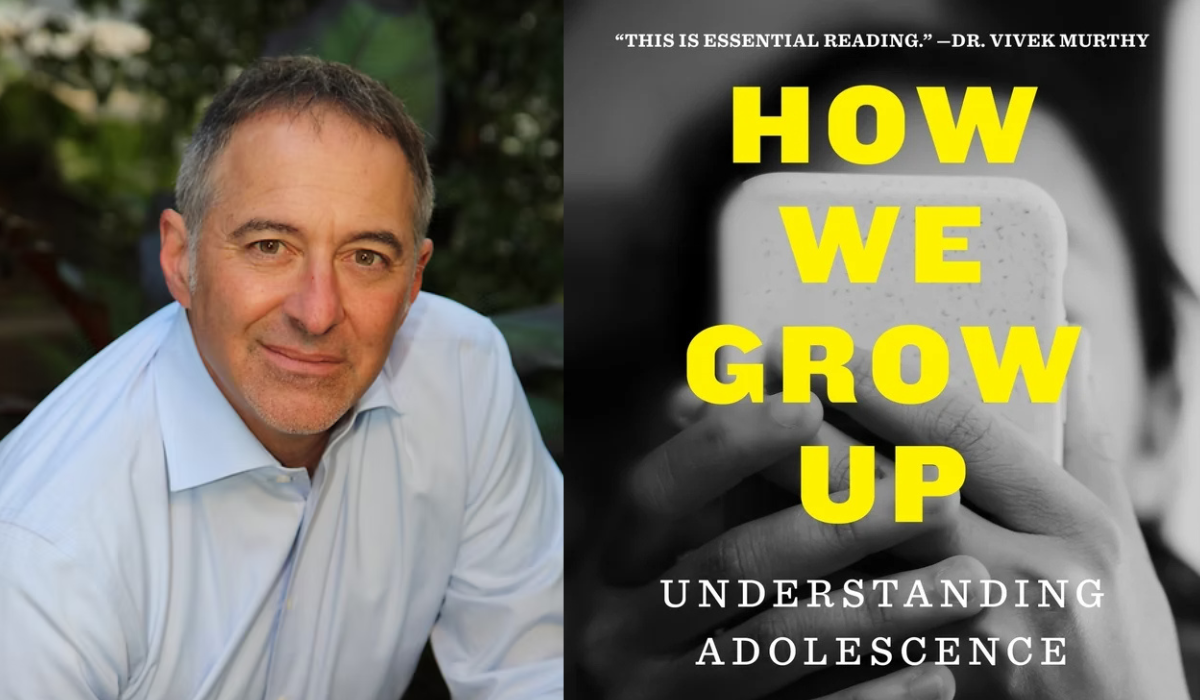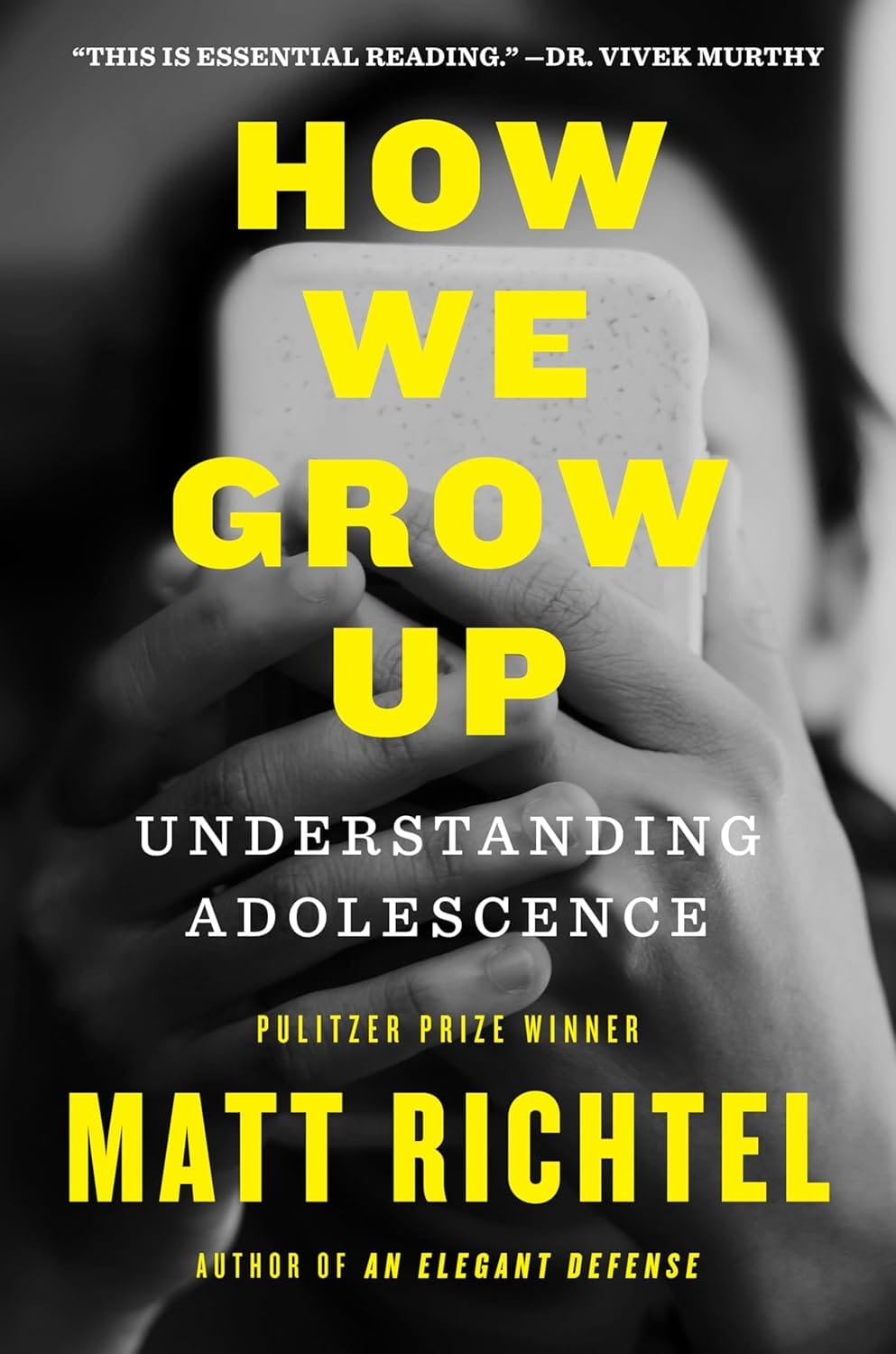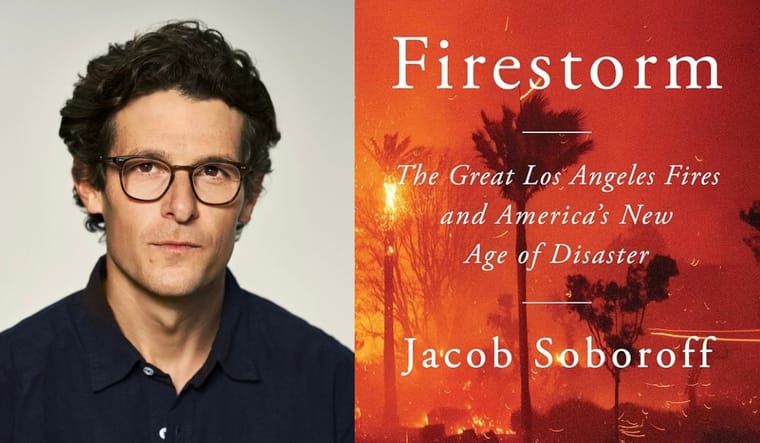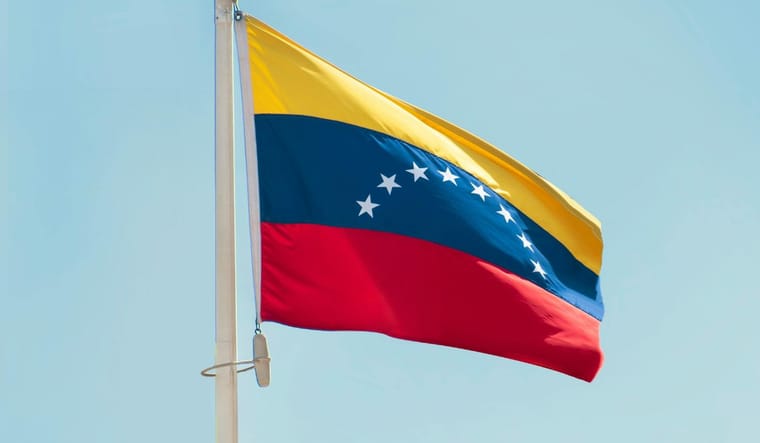Matt Richtel on the Pressures (and Joys) of Being a Dad Today

Parenting has never been easy—but these days it’s especially challenging. Between cell phones and social media, a mental health crisis among our youth, and a steady stream of unsettling headlines, raising kids in this moment in time can feel downright overwhelming.
Pulitzer Prize-winning journalist Matt Richtel gets it. He spent nearly two years reporting a nine-part New York Times series on the post-pandemic adolescent mental health crisis called "The Inner Pandemic," and it left him with more questions than answers. Richtel set out to answer some of those lingering queries in his new book, How We Grow Up: Understanding Adolescence.
What he found is that while we’ve collectively talked a lot about the impact of smart phones on adolescents, we haven’t looked at the nature of adolescence itself. Richtel’s book was an effort to go behind the phones and look at the people holding them—and what emerged was a new understanding of what it takes to raise resilient, emotionally grounded kids.
For Father’s Day, we asked Richtel to reflect on what adolescence can teach all of us about resilience. He shares stories from his own life as a dad, explains the science that changed his perspective on what teens today really need, and offers insights on the vulnerability and authenticity it takes to show up for our kids—and ourselves—with curiosity and compassion.
A CONVERSATION WITH MATT RICHTEL
Your new book, How We Grow Up, is all about understanding the science of adolescence. What was one of your biggest takeaways from your reporting?
We have talked kind of ad nauseum about the impact of the phone on the adolescence. We have done almost no talking about the nature of the adolescence or adolescents themselves.
It turns out to be timely because our understanding of adolescence has radically shifted. And adolescence itself has radically shifted. The upshot of those two things is this: If you really want to understand what’s happening with the adolescent and the phone, you got to understand the adolescent. And if you really want to know how to parent, or educate, or be an adolescent, it’s vital to understand how this pivotal life period has shifted and how the science has shifted.
What do more parents need to know about this science? And what do more adolescents themselves need to know about this pivotal life period?
Our emphasis on the phone has overlooked something fundamental, which is that we are not heading back to a simpler time. To emphasize the phone is like saying, “Are our politics going to get simpler? Are we going to get less information?” In reality, what’s happening right now is a generation of adolescents growing up who must learn to learn to cope with a more chaotic environment. And what we're seeing right now is the emergence of what I like to call the teen life crisis.
What is the teen life crisis?
You’ve heard of the midlife crisis. What it meant was that we could coast with blinders on for a long period until the complexities of life hit us and we realized there was a lot of coping that needed to happen with a lot of uncertainty. What's happened in recent years is that the uncertainties of older people have been pushed into younger generations, and it has effectively forced young people to deal with the very same kinds of fundamental issues that we once dealt with in our 40s and 50s: uncertainty, chaos, fast change, and the fact that there are no obvious rights or wrongs when it comes to a lot of decisions.
I believe this is a gift. The reason it's a gift is that we don't have any choice but to help our teens embrace this crisis. If they do, they are going to be equipped to be happier longer than we ever were because we drank and ignored and pushed away our feelings and ended up having to deal with some really hard things down the line. Adolescents right now don’t have the luxury of getting to subvert that.
So, what’s changed?
First, the nature of adolescence has changed. Puberty has fallen by about two years for girls. During puberty, what happens? Hormonal changes, yes. But puberty also sensitizes kids to their environment in a more profound way than before. Why? Because in this transition, you’re not only preparing to reproduce, you’re also preparing to be aware of a world around you that you didn’t need to be aware of before because you were protected by your parents.
When puberty hits earlier, you're more sensitive earlier to that external environment. Today, that environment is now exploding with information. Simultaneously, as puberty hits earlier and information gets louder, the rest of the brain, namely the prefrontal cortex, isn’t developing any earlier. That means the coping mechanisms needed to deal with that onslaught of information aren’t online yet. The accelerator is there but not the brake. This creates a neurological mismatch. That’s a deeper scientific look at what the phone is doing to kids. But the conversation can’t stop there.
A lot of times when young people are feeling overwhelmed, at an earlier age than perhaps they felt overwhelmed before, it’s very tempting to tell them they should not feel overwhelmed. But what we understand now is that when kids are dealing with overwhelming emotions, they're well beyond the point of reason. In fact, they’re overwhelmed to the point of shutting down.
When young people shut down, the act of reason, or talk, is not what you’re looking for. What you want to do is help young people through these moments of emotional paralysis. If we put coping mechanisms in place to help kids get through some of these hard moments, rather than become a generation of anxiety or rumination they will become a generation of copers. They will ride through the series of very difficult ups and downs that life presents us with a great deal of maturity and understanding that each time these moments hit, it should not be a moment to be derailed, but a moment to work on and get through to get to the good stuff of life.
I want this book to move beyond the concern that phones are affecting us and move to the fact that they are just a delivery system for modern life that we need to learn to cope with anyway.
You’re a dad of two teens. How has your reporting informed—and even changed—how you parent?
At the beginning of my book, there are three things I ask of parents. It’s a little glib, but I stand by it. I say love, lead, and let go. It connects to what I’ve learned, what the science has taught me, and what I hope will give parents a handrail.
The reason I emphasize love—and I mean unconditional love—is because it is a chaotic, fast-moving world. To the extent we create a baseline safety, that’ll get kids off on the right foot. But that’s a different conversation than “Be perfect.” My dad used to say if you could bat 300 as a parent, that would be pretty good. You can be unconditionally loving and bat 300.
What I mean by lead is that because the world is moving so fast, and because it can feel unfair or scary or out of control, it is more important than ever to get kids away from a sense of entitlement and to pander to them. That’s because the world is an unforgiving place. Part of unconditional love is being very clear with your kids that there are rules of politeness, fairness, how you treat other people, and how you need to behave to get along in a civil society. And in a certain way, society has gotten harder and we’ve gotten looser with our kids. We need to do the opposite.
Let go means you are not your adolescent and they are not you. You can unconditionally love them and lead them and say, “There are some things you’re going to go through that I don’t need to identify with, nor are your successes and failures my successes and failures.” The reason this is so important is that if we get ourselves get caught up in our kids’ emotions, we can’t help them through those things, and we’ve made them worse.
The science has allowed me to become a better, but tougher, parent. I’ve used the “dad” voice in certain circumstances where absent this learning, I would’ve tried something different. But given the nature of the world we’re in, it doesn’t serve me to pander to my kids, it serves me to be clear with them. I want them to be able to find a way to survive and cope and be happy in an environment that’s very difficult.
Do you have any advice for fathers, in particular, who are struggling trying to parent in a time of “toxic masculinity?”
I would say two things to dads: Vulnerability is not weakness, and strength is not meanness. The reason those things get paired together is that if you're strong without being vulnerable, that's toxic masculinity. If you’re vulnerable and own that life is difficult, then you have so much more credibility when you’re strong.
But I wouldn’t distinguish dads from moms in that way. The only reason I’d draw a distinction is because men sometimes have more trouble being vulnerable. I keep saying to my son, “Vulnerability is strength. When you are strong, if it comes from a place of authenticity, it’s not meanness. But it can’t come from a place of authenticity if you can’t acknowledge vulnerability—if you can’t actually tell the difference between when you’re offended because your ego is too big and when you feel sad because things are hard or difficult.
What did your research turn up as the best way to support young people today?
The most basic thing to recognize is what is actually happening. It’s tempting to think your kiddo is truly ruminating on x, y, or z difficult social or interpersonal event. But that is a manifestation of something else, and oftentimes it is a manifestation of being overwhelmed. And it is taking the form of excruciating emotional duress.
A lot of what we are all dealing with—including young people—is a sense of being overwhelmed in a chaotic world. This is the baseline for parents, because recognizing this keeps us from engaging our kids as if all these terrors are real. Instead, what we want to do is engage them as creatures having really intense emotional experiences and then help them get through those so that then we can have a conversation. They are having lightning storms in their brain. Let’s get them inside and safe before we try to help them.
What does that mean? Learn some of the skills in Cognitive Behavioral Therapy (CBT) and Dialectical Behavioral Therapy (DBT) that help people move through intense emotional experiences. There are a lot of little tactics you can recommend adolescents try as well, like taking a cold shower, getting some exercise, making sure they get sleep and good nutrition, making sure they feel safe. These tactics help the emotions pass so that then you can have a conversation that might sound a little more rational.
What I discourage parents from doing is identifying with the emotion our kids are feeling, or over-pathologizing the emotion. We are in a period of teen life crisis. Let’s give them coping skills.
To do that, we may need to look at how we do that ourselves, yes?
In no small way, we are contributing to our kids’ problems either by validating them or by adding additional forms of emotional duress to an already taxed person.
There’s a chapter in my book called “Dear Parents, You are Being Fear Mongers.” I urge parents to have some sense of balance and even optimism. Things are going to be OK. I’m not talking about going back to the 1950s and denying the challenges we face. I’m talking about the very same advice I’m asking adolescents to take, I’m asking parents to take: Acknowledge that there are very difficult things we face, and they are not crises every time.
We all have to grow up to face a very challenging world that will not yield to us. Do you want to be on the waves of sadness, grief, and news cycles? Or do you want to rise above that so you can live your life and help people?
Matt Richtel is a reporter at the New York Times. He received the Pulitzer Prize for national reporting for a series of articles about distracted driving. His 2022 New York Times series on teen mental health, “The Inner Pandemic,” won first place in public health reporting from the Awards for Excellence in Health Care Journalism and drew national media attention. You can pre-order his new book, How We Grow Up: Understanding Adolescence here.
Please note that we may receive affiliate commissions from the sales of linked products.




